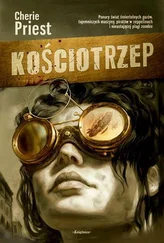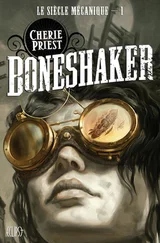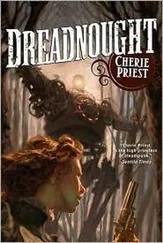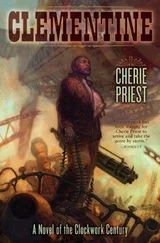Grimly, he warned, “We can count on Kirby Troost to do his job, and more. But right now, we need a plan. We need to get our story straight and our actions in order before Haymes makes her next move.” He straightened the bookcase he’d knocked ajar in his moment of anger, nudging it back into place and setting two books aright. “We need to send word to our operatives before the police find their way back here, as they inevitably shall. And when Troost finishes evacuating my family, he’ll be back. We must be certain that we are ready for him. ”
On Monday morning, Maria awoke to a knock on her hotel room door. She threw her coat over her dressing gown and fished around on the cold wood floor for her slippers, but couldn’t find them, so she gave up and tiptoed from rug to rug, turning up the heat as she passed the radiator. “I’m coming,” she called sleepily. She wondered what time it was, but could see through the crack in the curtains that it must be an hour past dawn at least. She hadn’t meant to sleep so late.
Henry Epperson was staying right across the hall, so she assumed that it must be him, but when she opened the door, she found an errand boy of perhaps ten or eleven years old with a stack of telegrams in his fist. “Are you Miss Boyd?” he asked. She nodded. He thrust the loose papers forward. “Here.”
“Thank you,” she said, rubbing her eyes. Seeing that the boy lingered, she added, “One moment, dear.” Her bag was sitting next to the washbasin. She stuffed her fingers into the side pocket and pulled out some pennies. “Here you go.”
She closed the door behind him and sorted the messages by the time they’d been sent—which was trickier than it should’ve been, as they were entirely out of order. But once she’d corrected the situation, she knew she needed to rouse Henry immediately.
She located her slippers, which had been kicked beneath the bed. She pulled on a pair of socks before donning them, not caring how silly it looked and doubting that anyone would notice. Across the hall she went, where she rapped her fist heartily, repeatedly on Henry’s door. “Henry? Are you up yet?”
“Yes, ma’am,” he said through the door, then opened it with a smile. “I’ve got some coffee in here. Can I talk you into sharing?”
“Coffee sounds wonderful.” She stepped past him as he held the door ajar. “But there’s no time to dillydally!”
He looked confused. “Not even for coffee?”
“An errand boy brought me these.” She showed him the notes. “They’ve been piling up overnight, apparently. One in particular is marked for urgent, immediate delivery, but it would seem that the taps aren’t manned as thoroughly as one might wish.”
Henry shook his head. “The military missives get first handling. Civilian messages get processed whenever the intake officer feels like sorting them out.”
“That’s a bum deal if you need to send a note in a hurry,” she complained.
“Far be it from me to argue with you. So what’s the rush?”
She fed him the telegrams one by one.
SUMMARY OF NURSING NOTES RECEIVED STOP AGREE ON ALL POINTS REGARDING GAS AND WEAPONS PROJECT DESIGNATED MAYNARD STOP WILL EXPECT REPORT ON ROBERTSON UPON YOUR RETURN FRIDAY STOP UNCLE A
MAYNARD IS ON THE MOVE STOP AUTHORIZATION GIVEN SANS UNCLE G STOP TARGETS CIVILIAN NOT MILITARY STOP ALERT OUR COUSIN KT TO WITHDRAW TO OTHER SIDE OF MD IMMEDIATELY STOP YOURS DR W ON AUTHORITY AND APPROVAL OF UNCLE A
“MD?” Henry frowned.
“Mason-Dixon, I should think,” she replied. “But Project Maynard … if Troost was right, now’s the time to really worry.”
Oh, I’m already worried plenty,” he said, and fiddled with the small slip of paper. “ Civilian targets. That’s not good.”
“It’s not a surprise, either. Everything I’ve heard of Haymes suggests she’s utterly soulless. But it doesn’t stop there. Look, here’s the next one.”
DO NOT RETURN TO DC STOP FIND OUR COUSIN KT FOR ASSISTANCE STOP MOST LIKELY TARGETS LARGE CITIES STOP MAYNARD COULD CLEAR A SQUARE MILE STOP RESULTING CLOUD MAY TRAVEL MILES FURTHER STOP WILL SEND WHATEVER HELP WE CAN MANAGE STOP
“I don’t even know who sent this one,” she said in a whisper. “Dr. Wellers, I expect, though it might be Dr. Bardsley.”
Henry didn’t dwell on that part. “Oh, God,” he said again.
“We need to find Kirby Troost, unless you think ‘KT’ stands for anybody else. But it’s his job to get Gideon’s family out of the South. I’m not sure how much assistance he can be to us until he does.”
He smiled weakly. “Only because you don’t know Kirby. He can handle more than one task at a time, and you can bet he’ll have some ideas and some connections. He always does. Come on—get yourself dressed, and I’ll get us a carriage. A clean carriage,” he emphasized, meaning one that wouldn’t need a driver.
“Five minutes, and I’ll meet you downstairs.”
In five minutes she dressed herself, threw on her boots, and lit a tiny fire in the enamel basin to destroy the telegrams. When they were reduced entirely to ashes, she grabbed her tapestry cloth bag and dashed down the stairs to find Henry standing beside a tiny cabriolet with a puttering, sputtering engine that shook the whole frame as it idled.
“After you, ma’am,” he said, holding the door open and offering his hand for her to climb up inside. She took it and ascended into the narrow cab, adjusting her skirts so he could shut the door. He crawled up into the other side, shut his own door, and adjusted the levers and wheel. He wrenched the vehicle into gear and it rambled forward, then he hit the brakes to avoid hitting a newspaper seller who’d dropped something in the road. “Sorry!” he shouted out the window. “Sorry,” he said again, and set the car moving forward, more carefully this time.
“It’s a shame there’s no glass in these windows, don’t you think?” Maria asked with a shudder. She tightened her coat and twisted her gloved hands up in her scarf, but that wasn’t enough to make her comfortable, not with the wind rushing inside the cab.
“Not such a shame if you’re keen to keep breathing. The exhaust creeps up from the engine—that’s why the windows are fixed this way. It’ll warm up a bit as we go, I promise. Heat also creeps inside, especially at your feet.”
They drove a few blocks east, which was not at all in the direction of Lookout Mountain—a fact that Maria knew because she could see its craggy, winter-bald point off to the south. She was on the verge of asking why they were taking this path when Henry explained, “We have to get past the wall, and the nearest gate is over here. Under different circumstances, I’d take the long way around to cover our tracks … but we’re short on time, and I don’t know about you, but I haven’t seen anyone following us.”
“No, we’ve been fortunate so far,” she said, with more confidence than she felt.
Before long, the wall loomed up close.
It was a sheer, flat, inscrutable thing—a vast construction designed with traditional military precision and lack of finer detail. A massive half-moon over a hundred feet high, it was painted Confederate gray, partly as a patriotic statement, partly to protect it from the elements, and partly because gray paint was cheap. A wide double gate hung open, with one lane of traffic spilling slowly inward, and one lane of traffic proceeding outward at a somewhat faster pace.
Maria reached into her bag for the papers identifying her as a nurse, but Henry told her not to bother. “They check you coming in, not going out.”
“They didn’t check me coming in.”
Читать дальше










